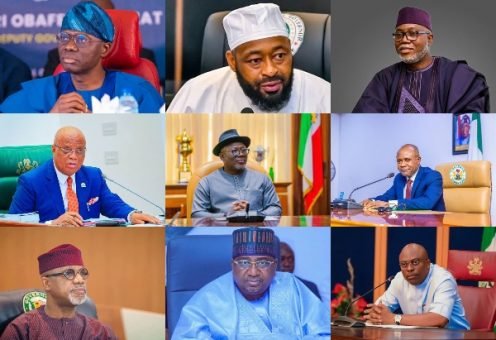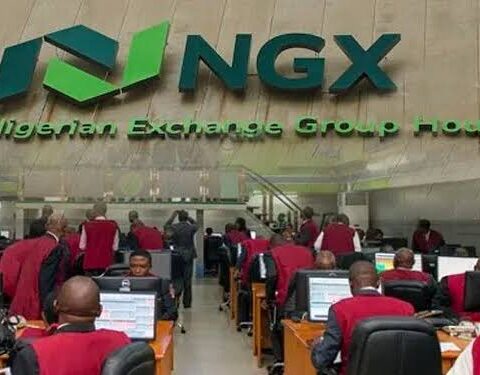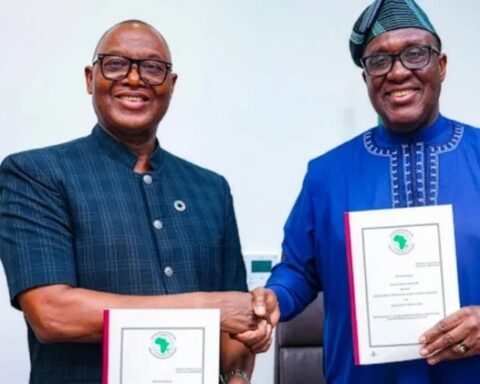In a significant response to the nation’s rising cost of living, Governors across Nigeria have announced revised minimum wages for state civil servants, signaling increased attention to labor welfare.
The federal minimum wage, recently set at ₦70,000, served as a baseline that numerous state governors have surpassed.
These measures aim to cushion workers from the persistent inflation and economic pressures currently facing the country. Below is a rundown of each state’s recent minimum wage adjustment and the rationale provided by state leaders
Lagos State: Governor Babajide Sanwo-Olu – ₦85,000
On October 16, 2024, Lagos State Governor Babajide Sanwo-Olu approved an increment to a minimum wage of ₦85,000 for state workers, marking a ₦15,000 increase above the federal minimum. Known for its high cost of living, Lagos presents a unique challenge for its workforce, and this adjustment reflects Sanwo-Olu’s recognition of the economic strain on residents. Expressing a future-oriented perspective, the governor noted his ambition to raise the minimum wage further to ₦100,000 by January 2025, highlighting his administration’s commitment to a sustained improvement in workers’ financial stability.
Rivers State: Governor Siminalayi Fubara – ₦85,000
Just two days after Lagos, Rivers State Governor Siminalayi Fubara joined the ₦85,000 minimum wage bracket on October 18, 2024. His announcement underscored the state’s intention to match Lagos in valuing workers’ welfare, particularly given the strategic economic role Rivers State plays within the oil-rich Niger Delta region. The adjustment is expected to have a meaningful impact on the livelihoods of the state’s public servants, making Rivers one of the leading states in Nigeria to match or exceed the federal benchmark.
Enugu State: Governor Peter Mbah – ₦80,000
Enugu State Governor Peter Mbah approved a minimum wage increase to ₦80,000, effective immediately. Following a committee review on wage issues, Mbah expressed his administration’s commitment to worker welfare, emphasizing that the welfare of civil servants is a non-negotiable priority. This wage increment is intended to assist public servants in coping with inflation and elevated living expenses, resonating well with the state’s commitment to inclusive governance.
Akwa Ibom State: Governor Umo Eno – ₦80,000
In a similar vein, Akwa Ibom State Governor Umo Eno announced a minimum wage of ₦80,000 on October 18, 2024. To ensure seamless implementation, Governor Eno established a committee headed by Effiong Essien, the Head of Civil Service, with a mandate to provide a report within a month. This administrative approach showcases Akwa Ibom’s careful planning in enacting the policy, which is expected to set a sustainable precedent for the state’s civil service wage standards.
Niger State: Governor Mohammed Bago – ₦80,000 (Effective November 2024)
Governor Mohammed Bago of Niger State also announced a wage increase to ₦80,000 but noted that it would commence in November 2024. After extensive consultations with the Nigeria Labour Congress (NLC), Bago assured that the state had made the necessary provisions to sustain this wage level, emphasizing the commitment of his administration to prioritize workers’ welfare.
Delta State: Governor Sheriff Oborevwori – ₦77,500
Delta State announced a minimum wage of ₦77,500, effective from the end of October. Secretary to the State Government, Dr. Kingsley Emu, confirmed the wage adjustment during a meeting with labor leaders from the Nigeria Labour Congress (NLC), Trade Union Congress (TUC), and Joint Negotiating Council (JNC). The structured communication with organized labor reflects the administration’s collaborative approach to wage negotiations.
Ogun State: Governor Dapo Abiodun – ₦77,000
On October 15, Governor Dapo Abiodun of Ogun State confirmed an increase to ₦77,000 for civil servants. His administration released an official statement outlining that the wage review aimed to reflect Ogun State’s commitment to alleviating economic hardships for its workers, especially in a period marked by rising inflation.
Kebbi State: Governor Nasir Idris – ₦75,000
In Kebbi State, Governor Nasir Idris approved a minimum wage of ₦75,000 on October 23. This increase aligns with efforts to boost worker morale and standard of living, following conversations between the state government and the Kebbi branch of the Nigerian Labour Congress. This announcement reinforces Kebbi’s intent to align its wage structure with other proactive states.
Ondo State: Governor Lucky Aiyedatiwa – ₦73,000
Governor Lucky Aiyedatiwa of Ondo State unveiled a minimum wage of ₦73,000 as part of his campaign kickoff on October 12 ahead of the November 16 governorship election. This move is seen as a commitment to workers’ welfare, potentially impacting voter perception and strengthening his administration’s labor relations as the election approaches.
Kogi State: Governor Usman Ododo – ₦72,500
Governor Usman Ododo of Kogi State approved a minimum wage of ₦72,500 and suspended taxes on the increment for a year, offering workers immediate relief. This approach not only boosts workers’ take-home pay but reflects Ododo’s strategic approach to creating a supportive environment for civil servants amid ongoing economic pressures.
Gombe State: Governor Muhammad Yahaya – ₦71,500
Gombe State Governor Muhammad Yahaya has established a minimum wage of ₦71,500, underscoring his government’s commitment to state labor welfare. The agreement was reached after discussions with the Nigeria Labour Congress, reinforcing Yahaya’s administration’s engagement with labor representatives and his willingness to address inflation’s impact on workers.
Broader Implications of the Wage Increases
The recent announcements across these states reflect a growing trend of state governments taking the lead in labor welfare reforms, transcending the federal baseline of ₦70,000. These wage increases come in the wake of rising inflation, which has greatly affected Nigeria’s urban and rural populations. Workers across the nation have welcomed these moves, while some have voiced a need for additional state support measures, such as tax reliefs and cost-of-living adjustments.
As each state enacts its new wage standards, the ripple effects may spur further wage policy changes across other regions. Additionally, the competitive nature of the wage increments indicates a broader acknowledgment of the challenges faced by Nigerian civil servants. The future promises continued adjustments, as Lagos’ plans to reach ₦100,000 suggest, and the call for equitable and sustainable worker compensation gains momentum across the nation. And there is strong indication that many state would join the trend.



























